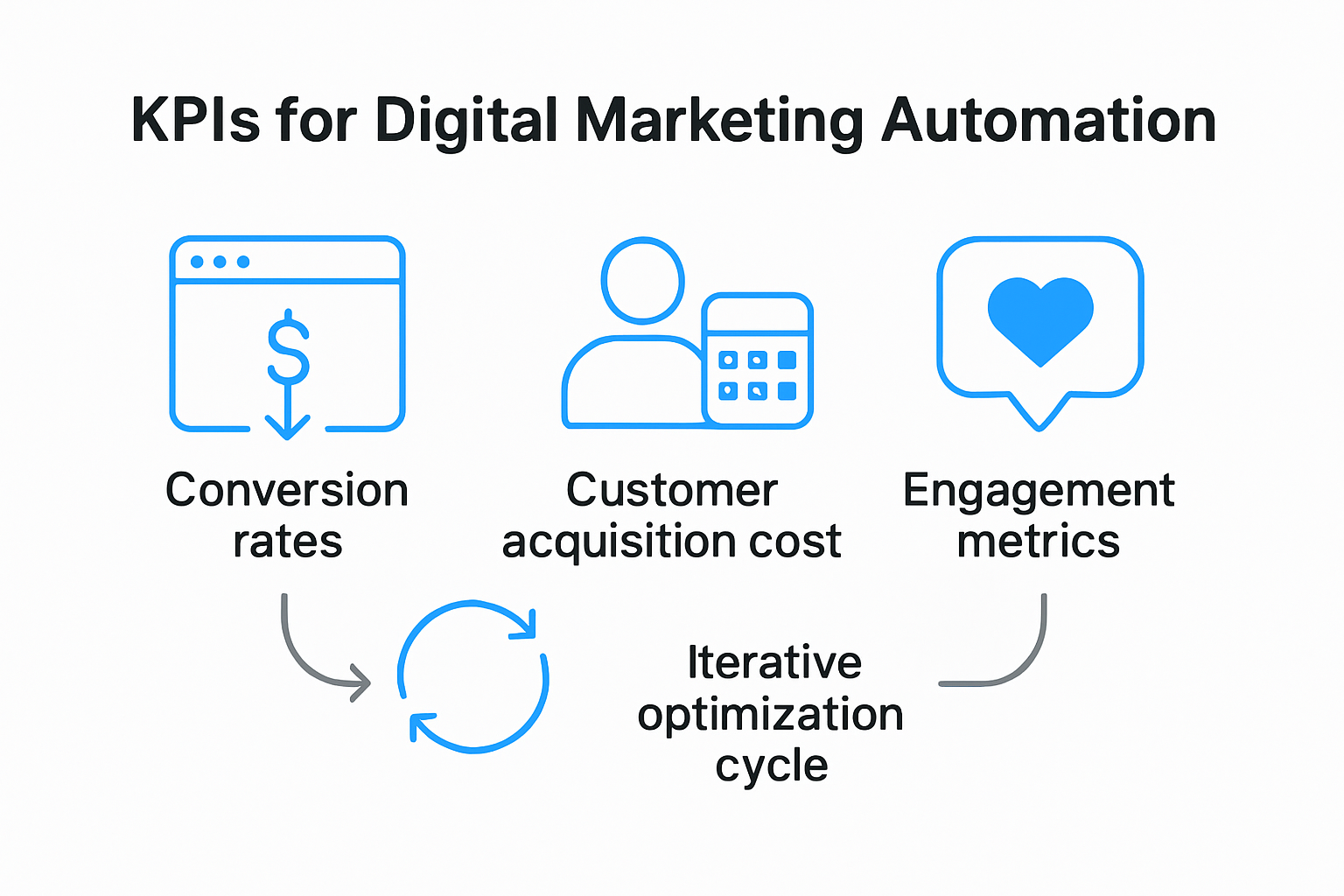Everyone is talking about automation in digital marketing and how it is changing the way businesses work. Now, most folks expect a small bump in productivity but the numbers look different. Research shows automation can save marketing teams up to 80 percent of their time on repetitive tasks alone. That sounds massive but the real surprise is not just about saving time. The true impact is showing up in how businesses now connect with customers in ways no one thought possible.
Table of Contents
- Key Benefits Of Automation In Digital Marketing
- Top Tools And Platforms For Marketers
- How To Implement Automation Across Channels
- Best Practices For Measuring Automation Success
Quick Summary
| Takeaway | Explanation |
|---|---|
| Leverage Automation for Efficiency | Marketing automation streamlines repetitive tasks, saving time and allowing teams to focus on strategy. |
| Utilise Advanced Customer Targeting | Automation enables hyper-targeted messaging through precise audience segmentation and dynamic content adaptation. |
| Implement Cross-Channel Strategies | Integrate various platforms to create seamless workflows and consistent customer messaging across all channels. |
| Track Key Performance Indicators | Measure success through specific KPIs, such as conversion rates and customer acquisition costs, for effective evaluation. |
| Continuous Monitoring and Optimization | Regular audits and feedback loops are crucial for iterating automation strategies and improving overall marketing performance. |
Key Benefits of Automation in Digital Marketing
Automation in digital marketing represents a transformative approach that enables businesses to optimise their marketing strategies with unprecedented precision and efficiency. By leveraging advanced technological tools, organisations can dramatically enhance their marketing performance, reduce manual workload, and deliver more personalised customer experiences.
Improved Operational Efficiency and Productivity
Digital marketing automation fundamentally revolutionises how businesses manage their marketing workflows. According to research from Pace University, automation tools enable companies to streamline repetitive tasks, allowing marketing teams to focus on strategic initiatives rather than mundane administrative processes.
- Time Savings: Automated systems can handle complex tasks like email segmentation, social media posting, and lead nurturing with minimal human intervention.
- Consistent Execution: Marketing campaigns can be scheduled and deployed consistently across multiple platforms without manual oversight.
- Resource Optimisation: Teams can reallocate human resources towards creative strategy and complex problem-solving.
Enhanced Customer Targeting and Personalisation
Advanced automation technologies provide unprecedented capabilities for precise customer targeting. By analysing user behaviour, preferences, and interaction data, businesses can create highly personalised marketing experiences that resonate more effectively with individual consumers.
- Segmentation Precision: Machine learning algorithms can segment audiences with remarkable accuracy, enabling hyper-targeted messaging.
- Dynamic Content Adaptation: Marketing materials can be automatically adjusted based on real-time user interactions and preferences.
- Personalised Customer Journeys: Automated systems can track and respond to customer behaviours across multiple touchpoints, creating seamless engagement experiences.
Measurable Performance and Data-Driven Insights
Automation transforms marketing from a subjective discipline to a data-driven science. By integrating sophisticated tracking and analytics tools, businesses gain unprecedented visibility into marketing performance and customer behaviour.
- Real-Time Analytics: Instant performance metrics allow for rapid strategy adjustments and optimization.
Businesses seeking comprehensive digital solutions can explore our advanced marketing strategies to leverage these transformative technologies effectively. The future of marketing lies not just in automation, but in intelligent, strategic implementation that creates meaningful connections with customers.
Top Tools and Platforms for Marketers
The digital marketing landscape is rapidly evolving, with sophisticated automation tools transforming how businesses engage with customers. According to Salesforce, selecting the right platforms can significantly enhance marketing efficiency and effectiveness.
Customer Relationship Management (CRM) and Marketing Automation Platforms
Modern marketers require robust platforms that integrate multiple functions seamlessly. These comprehensive tools enable businesses to manage customer interactions, track marketing campaigns, and generate actionable insights.
- HubSpot: An all-in-one platform offering marketing, sales, and customer service automation
- Salesforce Marketing Cloud: Advanced solution for enterprise-level marketing coordination
- Mailchimp: User-friendly platform ideal for small to medium businesses
Communication and Engagement Tools
Learn more about personalised marketing strategies that leverage cutting-edge communication technologies. According to Simplilearn, platforms like ManyChat are revolutionising customer interaction through intelligent chatbot technologies.
- ManyChat: Enables automated messaging via Facebook Messenger and SMS
- Intercom: Provides conversational marketing and customer support solutions
- Drift: AI-powered conversational marketing platform
Analytics and Performance Tracking Platforms
Data-driven marketing requires sophisticated analytics tools that provide real-time insights and performance metrics. These platforms help businesses understand customer behaviour and optimize marketing strategies.
- Google Analytics: Comprehensive web analytics and performance tracking
- Mixpanel: Advanced user behaviour and product analytics
- SEMrush: Digital marketing and competitive intelligence platform
Choosing the right marketing automation tools depends on specific business needs, budget constraints, and strategic objectives. Businesses must carefully evaluate each platform’s features, integration capabilities, and scalability to ensure optimal digital marketing performance.
To help you compare the leading marketing automation tools mentioned, here’s a summary of their primary features and ideal business use:
| Platform | Main Features | Ideal For |
|---|---|---|
| HubSpot | Marketing, sales, and service automation | All-in-one for all business sizes |
| Salesforce Marketing Cloud | Enterprise-level marketing coordination | Large enterprises |
| Mailchimp | User-friendly email marketing and automation | Small to medium businesses |
| ManyChat | Automated messaging via Messenger and SMS | Social/chat-driven engagement |
| Intercom | Conversational marketing and customer support | Customer-focused teams |
| Drift | AI-powered conversational marketing | Real-time lead engagement |
| Google Analytics | Web analytics and performance tracking | Businesses needing in-depth insights |
| Mixpanel | Advanced user behaviour and product analytics | Product-focused companies |
| SEMrush | Digital marketing and competitive intelligence | SEO & competitive digital analysis |
How to Implement Automation Across Channels
Implementing marketing automation across multiple channels requires a strategic and systematic approach that ensures seamless integration and consistent customer experiences. The process demands careful planning, technological understanding, and a comprehensive view of your organisational marketing ecosystem.
Database Preparation and Segmentation
Successful marketing automation begins with robust database management. According to research from NonProfit PRO, importing and segmenting your database is crucial for driving stronger connections with your target audience.
- Data Quality: Ensure your customer data is clean, accurate, and up-to-date
- Audience Segmentation: Create detailed personas based on demographic, behavioural, and engagement metrics
- Persona Mapping: Develop targeted communication strategies for each identified segment
Cross-Channel Integration Strategies
Effective automation requires a holistic approach that connects various marketing platforms and communication channels. Learn about optimising your digital marketing strategy to create a unified customer experience.
According to NCBI research, capturing detailed data on participant interactions can significantly enhance communication strategies. Key integration considerations include:
- Platform Connectivity: Ensure your CRM, email marketing, social media, and analytics tools can communicate seamlessly
- Workflow Automation: Design interconnected workflows that trigger actions across different channels
- Consistent Messaging: Maintain brand voice and communication style across all platforms
Monitoring and Continuous Optimization
Implementing marketing automation is an ongoing process that requires constant monitoring and refinement. Businesses must develop robust tracking mechanisms to assess the effectiveness of their automated marketing initiatives.
- Performance Metrics: Track key performance indicators (KPIs) across different channels
- A/B Testing: Continuously experiment with messaging, timing, and targeting
- Machine Learning Integration: Leverage AI technologies to improve automation strategies dynamically
Successful marketing automation is not about replacing human creativity but enhancing it. By strategically implementing these technologies, businesses can create more personalised, responsive, and effective marketing ecosystems that adapt to changing customer needs and preferences.
Below is a concise checklist of best practices for implementing and optimising marketing automation, based on the key steps highlighted in the article:
| Step | Importance | Status (Yes/No) |
|---|---|---|
| Ensure data quality and accuracy | Critical for segmentation | |
| Segment audiences into personas | Drives targeted messaging | |
| Develop customised communication | Improves engagement | |
| Integrate platforms and channels | Enables seamless automation | |
| Create interconnected workflows | Boosts operational efficiency | |
| Maintain consistent messaging | Builds brand trust | |
| Monitor KPIs and performance | Essential for optimisation | |
| Conduct A/B testing regularly | Refines strategies | |
| Apply feedback for continuous improvement | Ensures long-term success |
Best Practices for Measuring Automation Success
Measuring the success of digital marketing automation requires a comprehensive and strategic approach that goes beyond traditional performance metrics. Businesses must develop nuanced evaluation frameworks that capture the multifaceted impact of automation technologies on overall marketing effectiveness.

Key Performance Indicators (KPIs) for Automation
Identifying and tracking the right performance indicators is crucial for understanding the true value of marketing automation. According to TechTarget, effective measurement involves integrating marketing and sales insights to create a holistic view of performance.
- Conversion Rates: Track the percentage of leads transformed into customers through automated workflows
- Customer Acquisition Cost: Measure the efficiency of automated marketing processes in reducing overall acquisition expenses
- Engagement Metrics: Analyse interaction rates across different automated communication channels
Advanced Analytics and Attribution Modeling
Modern marketing automation demands sophisticated analytical approaches that provide deeper insights into customer behaviour and campaign performance. Explore our advanced digital marketing strategies to understand comprehensive measurement techniques.
Advanced attribution models enable businesses to:
- Multi-Touch Attribution: Understand the complete customer journey and identify critical touchpoints
- Predictive Analytics: Leverage machine learning to forecast future marketing performance
- Customer Lifetime Value Calculation: Assess the long-term impact of automation strategies
Continuous Improvement and Iterative Optimization
Successful marketing automation is not a one-time implementation but an ongoing process of refinement and adaptation. Businesses must develop robust feedback mechanisms that allow for continuous learning and strategy adjustment.
- Regular Performance Audits: Conduct comprehensive reviews of automation strategies
- Comparative Benchmarking: Compare performance against industry standards and competitors
- Feedback Integration: Incorporate insights from sales teams and customer interactions
The ultimate goal of measuring automation success extends beyond numerical metrics. It involves understanding how technological solutions enhance customer experiences, streamline operational processes, and create more meaningful connections between businesses and their target audiences. By adopting a holistic and data-driven approach, organisations can transform marketing automation from a tactical tool into a strategic advantage.

Frequently Asked Questions
What are the main benefits of automation in digital marketing?
Automation in digital marketing enhances operational efficiency, improves customer targeting through personalisation, and provides measurable performance insights, allowing businesses to connect with customers effectively and save time on repetitive tasks.
How can businesses implement marketing automation across different channels?
Businesses can implement marketing automation by ensuring robust database preparation and segmentation, integrating various marketing platforms for seamless communication, and continuously monitoring performance for optimisation.
What tools are commonly used for marketing automation?
Common tools for marketing automation include CRM platforms like HubSpot and Salesforce, communication tools like ManyChat and Intercom, and analytics platforms like Google Analytics and Mixpanel. Each tool serves different functions to streamline marketing efforts.
How do I measure the success of my marketing automation efforts?
Measuring success involves tracking key performance indicators (KPIs) such as conversion rates, customer acquisition costs, and engagement metrics. Additionally, advanced analytics and customer feedback can provide insights for continuous improvement.
Ready to Turn Marketing Complexity into Business Growth?
In the article above, we explored how automation in digital marketing is giving teams freedom from repetitive tasks and making a real difference in customer experience. Many businesses struggle with scattered workflows, missed opportunities through weak personalisation, and a lack of insight into what actually works. If you are feeling weighed down by these challenges or you want your business to take the next step with precise targeting, seamless workflows and reliable performance tracking, you are not alone.
Unlock the full promise of automation by building the right foundation. At Cloudfusion, our experts craft custom digital platforms that blend technical excellence and marketing strategy. We help you integrate the automation tools discussed in the article, creating tailored solutions designed for performance and growth. Let us help you connect the dots across channels, deliver stronger customer journeys and see clear results.
If you’re ready to empower your team and transform your digital marketing approach, request a quotation now and we’ll show you practical steps built for your business today.








